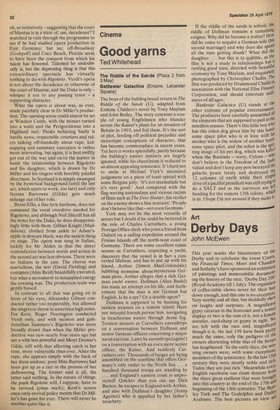Good yarns
Ted Whitehead
The Riddle of the Sands (Plaza 2 from 3 May) Battlestar Galactica (Empire, Leicester Square) The boys of the bulldog breed return in The Riddle of the Sands (U), adapted from Erskine Childers's novel by Tony Maylam and John Bailey. The story concerns a couple of young Englishmen who blunder across the Kaiser's plans for an invasion of Britain in 1903, and foil them. It's the sort of plot, feeding off political prejudice and stereotype conceptions of character, that has become commonplace in recent years. Yet here it works splendidly, partly because the bulldog's nastier instincts are largely ignored, while his chauvinism is reduced to an almost appealing innocence. It's hard not to smile at Michael York's measured judgement on a piece of toast spread with some Belgian jelly: It's not marmalade but it's very good.' And compared with the flag-waving nationalism and vicious racism of films such as The Deer Hunter, his verdict on the enemy shows a fine restraint: 'People don't behave like that —not even Germans.'
York may not be the most versatile of actors but I doubt if he could be bettered in the role of Charles Carruthers, a young Foreign Office clerk who joins a friend from Oxford on a sailing expedition around the Frisian Islands off the north-west coast of Germany. There are some excellent comic scenes as Carruthers, expecting a yacht, discovers that the vessel is in fact a converted lifeboat, and has to put up with his friend, Arthur (Simon MacCorkindale) babbling nonsense about mysterious German plots. Arthur alleges that a rich German yacht owner, Dollman (Alan Badel) has made an attempt on his life; and furthermore that the man is not German but English. Is he a spy? Or a double agent?
Dollman is supposed to be hunting for sunken treasure on a remote island. Here our intrepid friends pursue him, navigating in treacherous waters through dense fog. Tension mounts as Carruthers eavesdrops on a conversation between Dollman and senior German officers concerning a major naval exercise. Later he eavesdrops (again!) on a conversation with an even more senior officer, the Kaiser. And suddenly Carruthers sees. Thousands of barges are being assembled on the coastline that offers Germany's only outlet to the North Sea . . . a hundred thousand troops are standing by . . . and England's eastern coast is unprotected! Quicker than you can say Dick Barton, he escapes to England with Arthur, and also with Dollman's daughter (Jenny Agutter) who is appalled by her father's treachery. If the riddle of the sands is solved, the riddle of Dollman remains a tantalising enigma. Why did he become a traitor? How did he come to acquire a German wife (his second marriage) and why does she spend all the time getting drunk? What did the daughter . . . but this is to quibble, as the film is not a study in relationships but rattling good yarn, directed with beautiful economy by Tony Maylam, and exquisitely photographed by Christopher Challis. The film was produced by Drummond Challis in association with the National Film Finance Corporation, and should entertain au& ences of all ages. Battlestar Galactka (U) stands at the other extreme of popular entertainment; The producers have carefully assembled al' the elements that are supposed to pull in the mindless masses. There's this little boy wh° has this robot dog given him by this hant!' some space pilot who is in love with Ws mother who is the widow of another hand' some space pilot, and the robot is the spit' ting image of his pet dog, which was killed when the Russians — sorry, Cylons — don't believe in the Freedom of the Ind vidual and don't keep any pets betrayed the galactic peace treaty and destroyed the, 12 colonies of earth while their stur dove of a pacifist president was still trying tf, do a SALT and so the survivors are let,: heading for the remote 13th colony, which is us. I hope I'm not around if they make it.






































 Previous page
Previous page